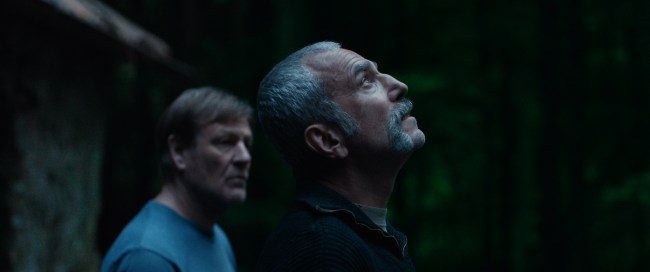That a movie like “Anemone” could only have been made by the forces of nepotism that govern it — it’s directed by Ronan Day-Lewis, and co-written by his father and the film‘s star Daniel Day-Lewis — is not something to ignore, but this dark, dense, deep two-hander about the Troubles in Ireland turns out to be quite better than you’d expect from that notion.
Daniel Day-Lewis stars as a former British soldier who defected from the Irish Republican Army after a particularly traumatizing incident involving a dead civilian, with his brother, played by Sean Bean, taking over his life in the process: his wife (Samantha Morton) and son (Samuel Bottomley), who in the present day has become a traumatized beater.
“Anemone” is a miserable movie top to toe, but it’s directed with enough promising skill to suggest actual smarts and talent on the part of its director/writer. Ones that aren’t only linked to its star, who comes back out from the acting retirement hole to deliver a performance that is typically great, with a monologue about taking an actual shit on a priest that formerly abused him (and spared his brother, Sean Bean) that goes up in the Daniel Day-Lewis hall of fame.
Or did he really do that? We are ever meant to question the narrative reliability here. While “Anemone” stutters in its final gasp of breath, with a closing segment that too tidily binds up its prickly narrative branches, the movie does manage to suck you into a whirlpool of pain and suffering that becomes oddly addictive.
“Anemone” isn’t destined for box office gold, despite its star’s seasoned imprimatur, the movie too cold to the touch and reliant on Irish-British history that forces you to listen closely to plot details expounded in drawn-out speeches. It’s scored by Bobby Krilic, aka Ari Aster’s composer Haxan Cloak, with what sounds like the indie-rock acoustic-and-synth tools of someone at the nadir of their life on the cold tile floor of the world’s most depressing bathroom. It’s shot by cinematographer Ben Fordesman with the style and grayed-out flourish of a supernatural horror movie, even as Ray Stoker’s (Daniel Day-Lewis) traumas are completely grounded in the real world. He’s contending with “a crack in the ice that wouldn’t heal over” after fleeing, some years ago, to the woods to live out the rest of his days after being deemed a war criminal by his compatriots.
His brother Jem (Sean Bean) took on duties of caring for Ray’s abandoned wife and child in the process, and now that grown-up son Brian (Bottomley) has himself been conscripted into the military, and was recently sent home for attacking a fellow serviceman for daring to speak his father’s name. Or daring to speak the rumors around him, as Brian is not aware of the fact that the man he thinks is his father is actually his uncle. Ray lives in filth in a hovel outpost in the middle-of-nowhere woods of North England, filthy enough that it’s noticed by Jem, who’s been jettisoned to recover him in order to speak some sense into Brian after his latest brush with pain, that he can barely wipe his own ass. And even refuses to. “You’re going to hell,” Jem tells Ray. “Family reunion!” Ray replies.
“Ever hear about the Troubles?” Nessa (Morton) bluntly asks her son after he brings a box of Ray’s former war correspondences down from the attic. “Anemone” does not proceed to give us a history lesson about the particulars of the thorny battles between Catholics and Protestants, royalists and independents. In fact, if you’re not caught up on your 20th-century European history, “Anemone” might not mean a whole hell of a lot to you, though Ronan Day-Lewis harks back to a bombing that emotionally scarred Ray with spareness and reserve.
There are also shots of Daniel Day-Lewis contemplating his own despair against the flickering flames of a bonfire that will bring “There Will Be Blood” and Daniel Plainview to mind, a man who has built up his hatred little by little over the years, and now has only venom to spew. “I did the crime, and I’m still serving the time,” Ray says at one point amid a spiky, literary screenplay that appreciates the lusciousness of good dialogue.
There is a hallucinatory late sequence in which Ray encounters a translucent dream creature that may or may not resemble his son; then, there is a hailstorm whose ensemble-linking gravitas recalls just a bit too closely that final frog-raining scene in “Magnolia,” a deus ex machina event tacked on to tie the whole thing together, but less pungent here.
While “Anemone,” which effectively captures the feeling of dropping a shot of coffee into your Guinness or the reverse, uppers and downers combined to maximal effect, is often too damp and dreary to a fault, the confidence behind the camera justifies the miserable ends. It’s a movie about lost souls, and how abuse begets further abuse and violence, even as Ray, the self-styled fugitive, has abandoned his life to try and prevent his son from absorbing his worst aspects.
This is a dense, unforgiving movie in the classic sense, an adults-only drama that doesn’t placate despite its stylistic overreaches. It’s disappointing that in its final moments, the movie has come so far off its own hinges, so deconstructed its own rivets, that it can’t put them back together again. But everything that’s come before is so rich that you’re ready to forgive it. The title, by the way, comes from the flowers that bloomed from Ray’s own father’s planting. Ronan Day-Lewis seems to have plucked and pruned the best lessons from them, too.
Grade: B
“Anemone” premiered at the 2025 New York Film Festival. Focus Features releases it Friday, October 3.
Want to stay up to date on IndieWire’s film reviews and critical thoughts? Subscribe here to our newly launched newsletter, In Review by David Ehrlich, in which our Chief Film Critic and Head Reviews Editor rounds up the best new reviews and streaming picks along with some exclusive musings — all only available to subscribers.



